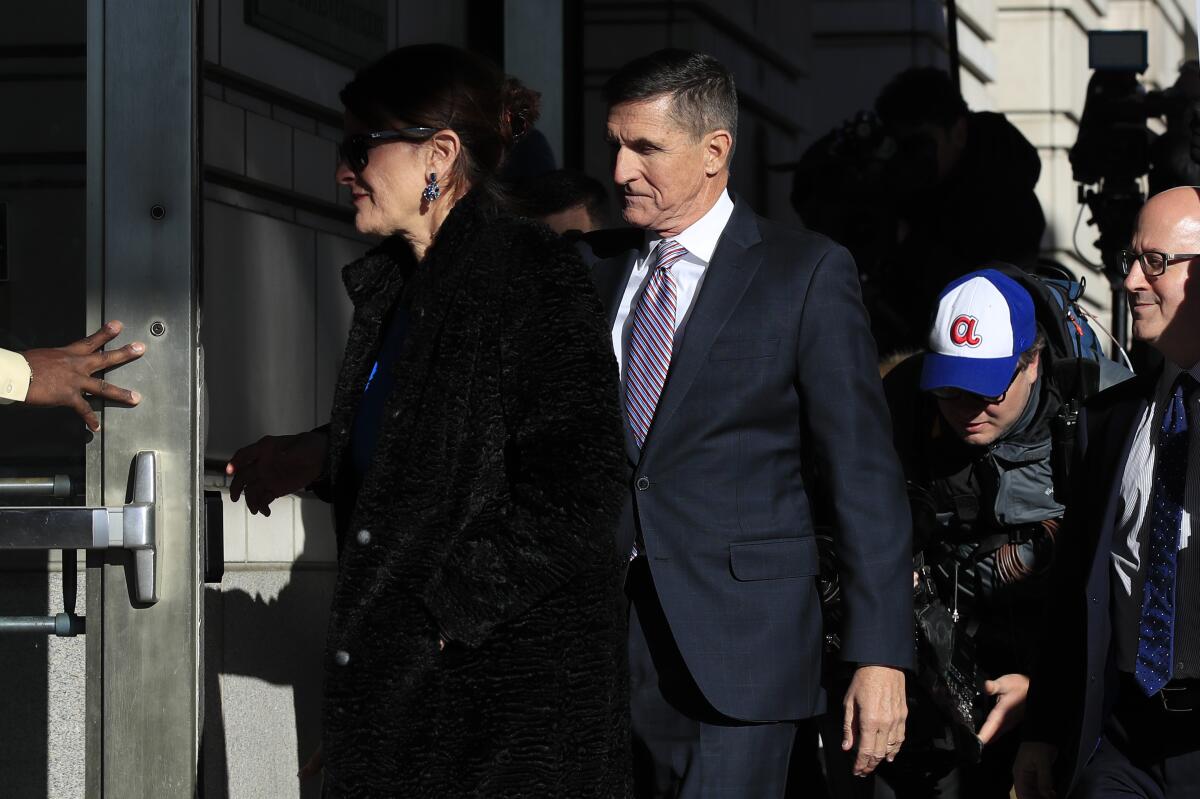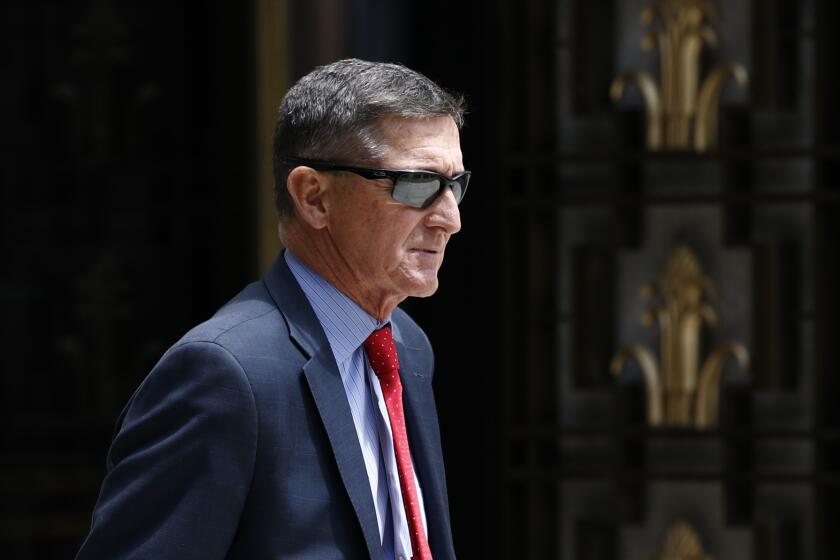Judge steers Flynn case into ‘completely uncharted waters’
- Share via
WASHINGTON — When Michael Flynn’s case was assigned to U.S. District Judge Emmet G. Sullivan in 2017, Flynn’s allies were ecstatic.
Sullivan was best known for tossing out the corruption conviction of Ted Stevens, the former senior Republican senator from Alaska, in 2009 and berating the prosecutors for withholding exculpatory evidence.
Flynn’s allies hoped Sullivan would take the same skeptical approach to the prosecution of the retired three-star Army general who briefly served as President Trump’s first national security advisor, only to be fired after three weeks and later plead guilty to lying to federal agents.
But Sullivan has been hard on Flynn every step of the way, and now he’s pushing back on Atty. Gen. William Barr’s extraordinary attempt to dismiss the case. The result is an unusual, perhaps unprecedented, legal tug-of-war involving one of the most high-profile prosecutions from the Russia investigation.
“We are in completely uncharted waters,” said Paul Rosenzweig, a former federal prosecutor.
Trump sought to exploit release of a declassified document tangentially tying Joe Biden to the Michael Flynn inquiry.
Barr’s decision means the Justice Department is essentially teaming up with the defense team to end the prosecution. Sullivan’s response could send Flynn to jail anyway.
He asked John Gleeson, a retired federal judge and former mob-busting prosecutor in New York, to argue against Barr’s motion. And he said Gleeson should recommend whether to charge Flynn with criminal contempt for perjury in court.
The saga began when Flynn pleaded guilty on Dec. 1, 2017, to lying to FBI agents about his phone calls with the Russian ambassador during the presidential transition period. He later reaffirmed his guilt when questioned by Sullivan during another hearing.
But Flynn sought to withdraw his plea this year. “In truth, I never lied,” he wrote in a Jan. 29 court filing.
Now Sullivan presumably wants to know whether Flynn was telling the truth when he pleaded guilty to lying to FBI agents, a felony — or to the judge, thus potentially committing perjury, when he stood by his guilty plea. Either way puts Flynn in potential jeopardy.
The convoluted maneuvering has legal experts straining to think of similar scenarios in the past.
“It’s unusual for the government to want to withdraw a case after the guilty plea. And it’s unusual for it to be in such a highly political context. And it’s unusual for the judge to have any reason to question the decision to withdraw a case,” said Erwin Chemerinsky, the law school dean at UC Berkeley. “It’s just such an extraordinary circumstance.”
Chemerinsky described Sullivan as “independent,” adding that “he’s a judge who will do what he thinks is right.”

Trump, who has never shied away from criticizing judges, complained about Sullivan in a Fox Business interview that aired Thursday.
Flynn’s “got a judge that I guess doesn’t like him very much,” Trump said. “Maybe the judge doesn’t like me very much.”
President Reagan first named Sullivan, a Washington native, as a Superior Court judge in 1984. President George H.W. Bush, another Republican, elevated him to the appeals court in 1991, and President Clinton, a Democrat, nominated him to the federal bench in 1994.
Sullivan oversaw the 2008 corruption trial of Stevens, the senator from Alaska who was convicted of accepting gifts from oil and construction firms. When it emerged that prosecutors had withheld evidence from the defense team, Atty. Gen. Eric Holder asked for the case to be voided.
“In nearly 25 years on the bench, I have never seen anything approaching the mishandling and misconduct I have seen in this case,” Sullivan told the prosecutors in scathing remarks. He then appointed a lawyer to conduct an independent investigation into the Stevens prosecution.
Flynn’s supporters were encouraged by this track record, especially when Sullivan directed prosecutors working for special counsel Robert S. Mueller III to turn over any exculpatory information to Flynn’s lawyers. It was a standard order, but some saw a hint that the judge was on Flynn’s side.
“He must suspect a defect in the guilty plea,” said Andrew Napolitano, a Fox News legal commentator.
That hope dissipated when Flynn appeared for sentencing on Dec. 18, 2018. Sullivan asked Flynn to reaffirm his guilt and excoriated him for secretly working as a lobbyist for Turkey while he was advising Trump’s campaign on national security issues.
“Arguably, that undermines everything this flag over here stands for,” Sullivan said. “Arguably, you sold your country out!”
Flynn, who served in the Army for more than three decades and handled battlefield intelligence operations in Iraq and Afghanistan, later said he was “stunned” by Sullivan’s comments.
“The entire experience was surreal, and that day was one of the worst days of my life,” he wrote in a court filing.
Sullivan decided not to sentence Flynn until he had finished cooperating in a separate prosecution of his former business partners. Prosecutors ultimately did not call Flynn as a witness in that trial, which took place last summer.
Trump’s first national security advisor, Michael Flynn, pleaded guilty in December 2017 to lying to the FBI in the Russia investigation. But now he insists his case should be thrown out and the alleged injustice has become a rallying cry for Trump supporters.
Flynn hired a new lawyer and began fighting to clear his name. Trump, who repeatedly mused about pardoning his former aide, cheered him on.
Sullivan did not accept Flynn’s conspiracy-tinged arguments that the Justice Department and the FBI were guilty of wrongdoing, not him. The judge concluded that Flynn “has failed to establish a single Brady violation,” a reference to the requirement that the government provide exculpatory evidence to defense attorneys.
It thus was a shock last week when Barr asked the judge to dismiss the case. Despite Flynn’s guilty plea, Barr said the Justice Department couldn’t prove he was guilty and agents didn’t have a valid reason to interview him in the first place.
Legal experts said it’s possible Sullivan could reject Barr’s motion and still sentence Flynn since he already pleaded guilty.
“It would almost create chaos in the system,” said Peter Johnson, a criminal defense attorney who teaches at UCLA.
George Terwilliger, a former deputy attorney general, said Sullivan had erred by appointing Gleeson to argue against the Justice Department. Before he was named, Gleeson co-authored a Washington Post op-ed criticizing Barr’s move to drop the Flynn case, writing “this is the rare case that requires extra scrutiny.”
“What [Sullivan] has done, in essence, is attempt to appoint a private prosecutor,” Terwilliger said.
Sullivan’s decision to consider holding Flynn in contempt was “beyond unorthodox,” he added. “It would be truly bizarre to say it’s contemptuous conduct for someone to exercise their right to try to withdraw their guilty plea.”
Rosenzweig agreed that Sullivan was pushing his authority to its limits, but only in response to an unorthodox move by the Justice Department.
Sullivan acted “in the face of what is clearly a politicized and contrived decision by Atty. Gen. Barr, whose sole purpose seems to be saving the president from the embarrassment from having to pardon Flynn,” he said.
More to Read
Sign up for Essential California
The most important California stories and recommendations in your inbox every morning.
You may occasionally receive promotional content from the Los Angeles Times.













